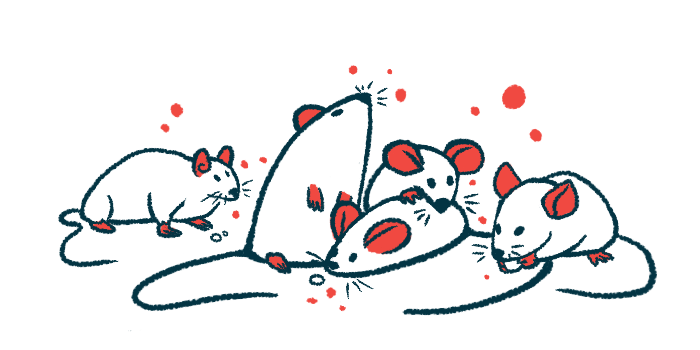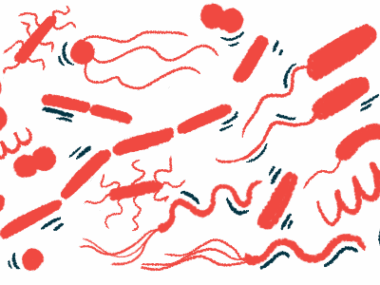PP-007 Resolves Lung Inflammation in CF Mouse Model
Written by |

Treatment with PP-007 — a compound known to promote the release of anti-inflammatory carbon monoxide (CO) gas — significantly reduced the levels of pro-inflammatory immune cells and molecules in the lungs of a mouse model of cystic fibrosis (CF), a study shows.
These benefits were associated with an increased production of the CO-inducing heme oxygenase-1 (HO-1) enzyme in macrophages, a type of immune cell implicated in CF, subsequently promoting resolution of lung inflammation.
PP-007’s anti-inflammatory effects did not hamper the animals’ immune defenses in the lungs — a common issue of standard anti-inflammatory treatments.
These findings highlight PP-007 as a potentially safer treatment to resolve chronic lung inflammation in people with CF, the researchers noted.
The study, “Recruitment of monocytes primed to express heme oxygenase-1 ameliorates pathological lung inflammation in cystic fibrosis,” was published in the journal Experimental & Molecular Medicine.
CF is characterized by the accumulation of thick and sticky mucus in the airways, which can cause chronic lung infection and inflammation, and subsequently promoting lung damage. Using anti-inflammatory medications in CF carries a risk of compromising the patients’ host defense, which can cause lung infection.
As such, “there is a need for novel therapeutic approaches that, in combination with CFTR modulators, rescue the abnormal anti-inflammatory regulatory mechanisms and facilitate the resolution of the inflammatory response while maintaining potent antimicrobial host defense,” the researchers wrote.
The never-ending cycle of inflammation in CF is mainly dependent on immune cells called neutrophils that pronouncedly infiltrate the lungs, making them a potential target of CF therapies.
Macrophages, involved in the fight against infections and inflammation resolution, are known to be dysfunctional in CF. They are hyperresponsive to inflammatory triggers and are unable to efficiently induce the HO-1/CO pathway, known to mediate inflammation resolution.
HO-1 enzyme’s activity promotes the production of CO, which in turn increases the levels of HO-1. While toxic at relatively high concentrations, CO has strong anti-inflammatory, antioxidant, and antibacterial properties.
The “delivery of controlled doses of CO by inhalation to induce endogenous HO-1 has long been associated with beneficial effects in many inflammatory lung diseases,” but “controlled delivery of nontoxic doses of CO can be challenging,” the researchers wrote.
Now, a team in the U.S. evaluated the effects of treating CF and CF-like mouse models with Prolong Pharmaceuticals’ PP-007, a CO-releasing agent tested in clinical trials for other conditions with increased inflammation. Prolong was also involved in the study.
PP-007 is designed to release CO through an exchange for oxygen, which is then delivered to areas of hypoxia, or low oxygen levels. This dual mode of action targets two complications of muco-obstructive lung diseases like CF: inflammation and hypoxia.
Results showed that a single clinically relevant dose of PP-007, administered directly into the bloodstream, significantly reduced neutrophil numbers and the levels of pro-inflammatory molecules in the animals’ lungs in response to bacterial infection.
This was accompanied by a switch from a pro-inflammatory to an anti-inflammatory state in macrophages, which were also found to produce high levels of HO-1, suggesting that PP-007 rescues HO-1/CO pathway deficiency in these cells.
Further analyses revealed that PP-007’s beneficial effects were associated with an induction of high HO-1 levels in circulating monocytes, immune cells that can mature into macrophages, that entered the lungs in response to infection.
Importantly, the therapy did not weaken efficient host defense or compromise the clearance of Pseudomonas aeruginosa — a common cause of bacterial lung infections in CF — in the setting of chronic airway infection in these mice.
While mice pre-treated with PP-007 still showed an initial increase in pro-inflammatory molecules and the migration of neutrophils to the lungs after exposure to bacteria, there was a faster resolution of lung inflammation, with reductions in pro-inflammatory immune cells and molecules.
These findings highlight that “PP-007 delivery primes [macrophages] to re-establish a normal immune response to [bacterial exposure] … under conditions of dysregulated immunity,” the researchers wrote.
“We demonstrate the potential utility of PP-007 in controlling neutrophilic pulmonary inflammation in the context of diseases such as CF and muco-obstructive lung diseases,” by “promoting the expression of HO-1 in monocytes/macrophages,” they added.
Since these diseases are also characterized by hypoxia and PP-007 “also acts on hypoxic tissues and protects against oxidant-induced damage,” this therapy may provide even greater benefits, the team wrote.
In addition, PP-007 “may have additional benefits compared with inhaled CO, especially in diseases, such as CF, in which systemic inflammation is a concern or thick mucus may prevent the full penetration of an inhaled medication into the lower airways,” they concluded.







